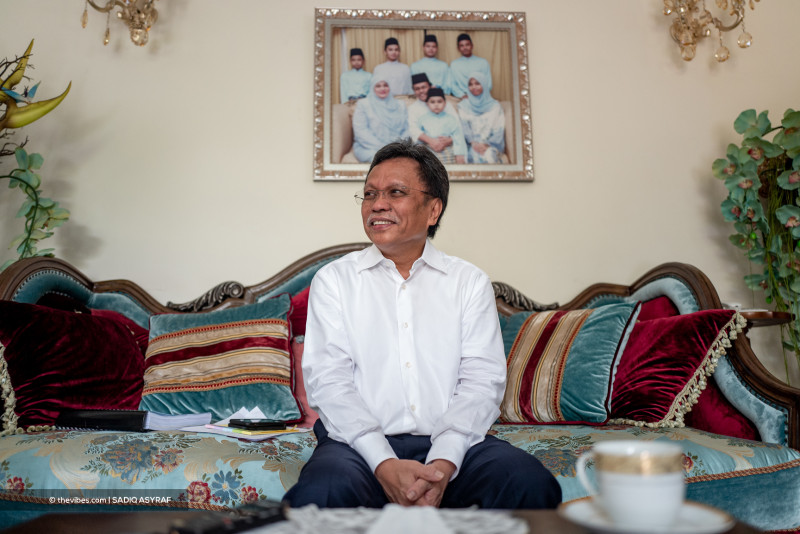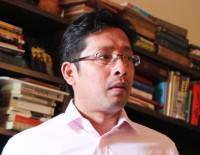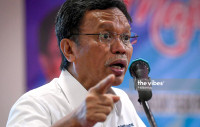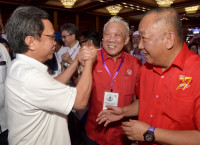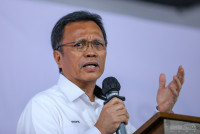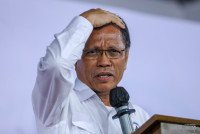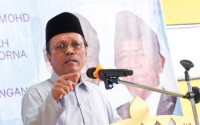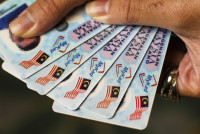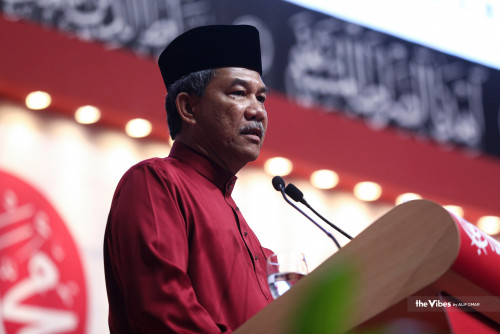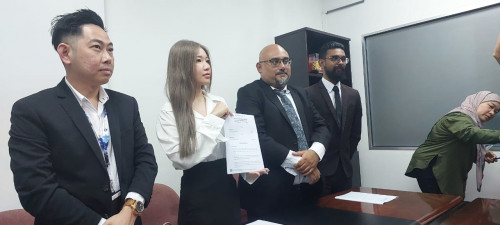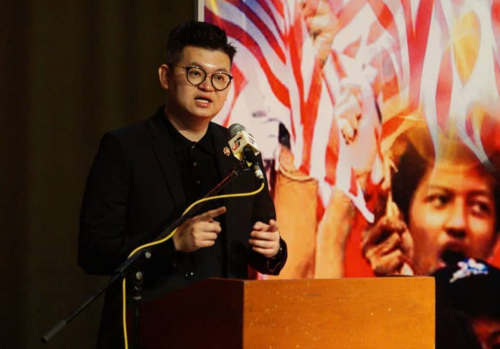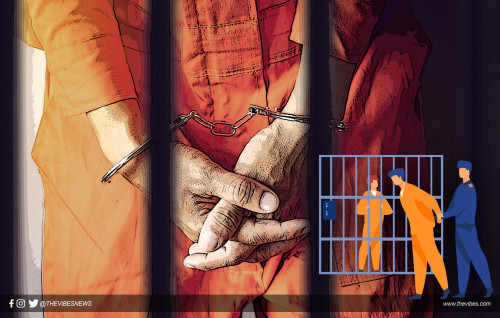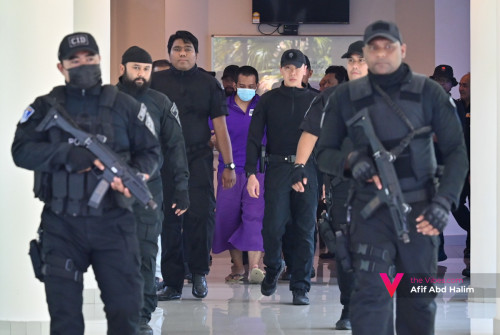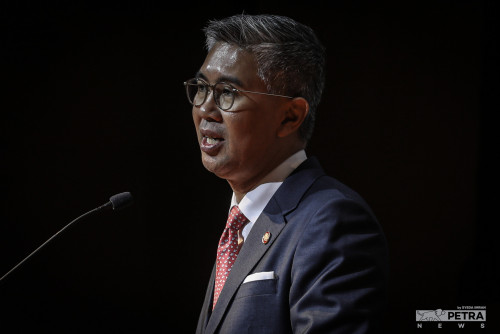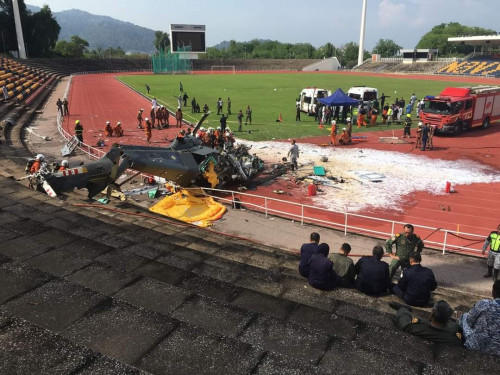KUALA LUMPUR – A former vice-president of Umno before quitting the party, he emerged as president of Warisan to clinch the chief ministership of Sabah. Most recently, he emerged as a possible prime ministerial candidate following the resignation of Tan Sri Muhyiddin Yassin.
In a candid and wide-ranging exclusive interview with The Vibes’ Eddin Khoo, just prior to delivering a speech in Parliament flaying the Pakatan Harapan’s signing of a memorandum of understanding with Datuk Seri Ismail Sabri Yaakob’s administration, Datuk Seri Mohd Shafie Apdal speaks of values in politics, East-West Malaysian relations and the challenges of a prime ministerial prospect from East Malaysia.
Eddin Khoo: Datuk Seri, the opposition signed a memorandum of understanding with the Ismail Sabri administration recently. Warisan appears not to have been a part of this. Can you explain what Warisan’s position actually is within the broader alignment of the opposition?
Shafie Apdal: I think Malaysians at large are not only confused by all that has been happening, but are truly fed up with politicians… People like us. Why is that so? Mainly because of how we function, practise, do things as politicians.
The country seems to be in an environment resembling mayhem, a state of confusion. There is an increasing tendency of political people to simply use the phrase “in the interest of the country and the people”. I ask whether this is all just sweet talk and lip service, and whether they really mean it.
This is why millions of Malaysians today are fed up: not only are they confused, they seem to be saying: “What are these guys doing?”
The fact of the matter is the mandate of the people in the last election was taken away; yet those who were responsible for this are today asking for help from people like me, who have been wronged. Are these the values we have in life?
The mandate that was given by the people to Pakatan Harapan was taken away through the Sheraton Move. Imagine how many millions of peoples’ hopes were shattered. They invested their effort, their money and sweat to ensure that there was a change in the government of the day. After 60-plus years of the Umno-led Barisan Nasional administration, we managed to topple it. And the people made sacrifices – even through rain and storm – they came out to vote, spent their own money, spread the word among their families.
They travelled home from as far as the United States and Australia; came back home to ensure we could unwind the system we had previously. And the moment that was done, the Sheraton Move happened.
The root cause of that was the tussle between Anwar and Dr Mahathir. There were a number of people from Pakatan Harapan, particularly PKR and DAP, who were openly calling for Mahathir to “go, step down”. Yet the moment Dr Mahathir stepped down these very people got angry and asked: “Why did he resign?”
But you were calling for it! And after he stepped down, all kinds of things started brewing and there was a clear sense of the lust and greed for power among so many.
Then the Sheraton Move was realised: they managed it for almost a year and a half. Along the way, something I, the world, could have never anticipated, happened.
Covid-19 has left many countries suffering. We (in Malaysia) have spent great amounts of money apparently battling Covid, but it does not tally with the outcome. Billions have been spent, yet what happened to the money? Look at the numbers of unemployed, not to mention the people who have died – over 20,000 and still counting.
It is appalling seeing what is happening. That’s why when you talk about “the country’s interest and the people’s interest” it does not mean you have to sign a memorandum, have a CSR (confidence and supply reform) kind of agreement. If you believe you want to build the country, help our people, don’t help me, don’t give ME money – give the money to my area, the people at large.
Why should you deprive us just because I didn’t sign the memorandum? This is about the people – Malaysians – needing help.
If you are thinking of the people, and the country, why just focus on us, the politicians? Why the need for the signing of a memorandum? Could it have something to do with the fact that you don’t have the numbers? You are sort of legalising the government of the day. This is not unlike what Muhyiddin did towards the end of his term when he started extending an olive branch. I asked then: “What is happening? This is tantamount to inducement. Where are our values?”
The people are asking now: “Why are you able to work together all of a sudden, when all this while you could not?”
Values must be forged, but you cannot mould values in the people if we, as leaders, can’t provide a good example.
Some opposition leaders came to see me. I sensed it had something to do with talking to the government of the day. I was already uneasy when some of the opposition leaders went to see Ismail Sabri even before he had announced his cabinet. I asked them: “Why would you do that? You have yet to know the line-up, can you know what comes after that?”
I thought there would be some kind of ‘wow’ factor to the line-up, but in the end it was just a matter of rearranging chairs in the room. They are the same chairs just changed from one corner to the other… And the opposition got caught all of a sudden when the same people were installed as ministers.
This is not the way forward for us. The people will feel further disgruntled by this and hopeless in such a situation. Some of the people in the opposition were even talking about “sweet cherry” – this is just nonsense!
We are talking about the country’s survival, and human lives. At the expense of death, you are playing around, talking about not wanting to work with court clusters even as those on your side are facing court cases, and are carrying the same burden.
That’s why I took the decision last year to remove Warisan from PH Plus. I decided I would need to distance myself, otherwise it would be cancerous.
Of course, it is not so easy…
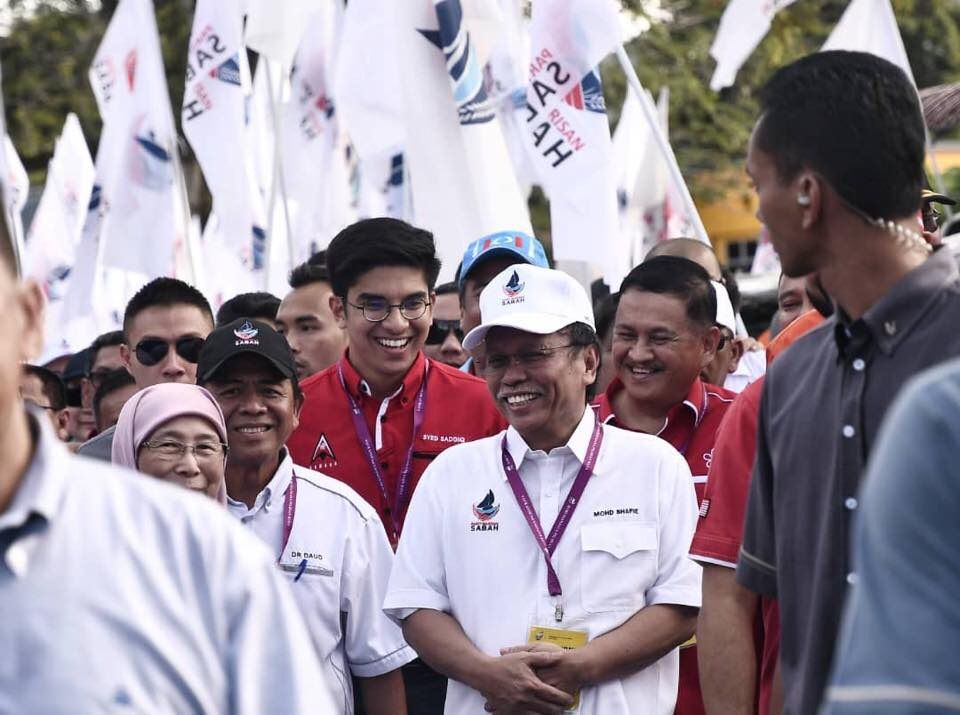
EK: Do you feel isolated?
SA: No, I don’t, because there is no sense that I need them. I think I am articulating what the rakyat feels. I believe if I feel and share the hardship of the people, why should I feel isolated just because they (PH Plus) are not by my side?
EK: But given the numbers and alignments today, is it even possible to have anything beyond a politics of convenience?
SA: First and foremost, what is most important is that those who are there (in Parliament) need to set an example.
Before a parent allows his daughter to be handed over for marriage, the father will need to check out the man – who is this person? What is his future? What is his behaviour? Is he a drug addict and criminal?
In this case I have to look into that too, because I am handing over the hopes of the people in this country.
Can I just hand over my support and confidence to those guys when I am not too sure about what it will mean? It’s a very muddy river out there; I don’t know what is in there. There might be crocodiles and snakes. I might get bitten. I think I have to be very careful. I know it’s not easy to go by principle alone, but I think it is time for someone to play this role.
I don’t feel isolated under the present environment. I think what is important is to keep in mind that I do not need to succumb to circumstances just because there are these 220 or so guys there, and that I need to comfort myself with stopgap measures just to ensure that this can be sustained. In life, God has already thought me how best to be a Muslim – to fast.
EK: Can you provide some insight into what Warisan’s position is on Ismail Sabri’s offer of parliamentary reforms?
SA: It’s good. We agree with that, but I have yet to see what it means. I am not privy to what they are discussing.
Let’s take the anti-hopping law as an example. What is actually identified as part and parcel of those reforms? First, there is the need to amend the constitution – Article 10. What, then, is the content of the anti-hopping law? Is it that if an individual jumps from one party to another there will be a by-election? Or will there be a proper solution to the problem – a suspension for two terms, perhaps, or an even heavier penalty – that the individual be barred from politics for life?
In life we don’t want to be punitive, but I think if you want to deter people from jumping from one party to another and setting a bad example, you should impose a heavy penalty.
I am president of Warisan, Dr Mahathir is the chairman of Pejuang. We have not been informed of any of this, possibly because they assume that Anwar (Ibrahim) as leader of the opposition will communicate and write a letter to us after which we will simply say “okay”.
I’m not saying Anwar is not eligible to be opposition leader – he definitely has the numbers – but that doesn’t mean I am a subsidiary to PKR.
Is Anwar to brief me about this deal he is doing with the government? I am not signing a memorandum with Anwar: I am signing a memorandum with the government. Why should I be briefed by Anwar? Anwar maybe has his own input about what, where, how the reform should be done. But that is not input I am privy to.
Take Undi18, for example. It has already been passed by the previous government, so why the need for us to put that as part of the agenda again? Isn’t that just sweet talk? This is how cosmetic things are used just to entice the people, and I think I have had enough of it!
EK: East Malaysian parties were decisive in determining the last prime minister and the present PM Ismail Sabri. What is the level of cohesion among East Malaysian parties to ensure that national matters work out in their interest?
SA: Sabah has been quite divided. On certain issues such as MA63 (Malaysia Agreement 1963), however, there is consensus. When we were in government I brought this matter up with Dr Mahathir and he somehow supported it. Unfortunately, our counterparts in Sarawak joined a pact with PAS and Umno to reject it, due to some discontent about Article 161 on their part. They wanted Article 161 on board as well, but the then attorney-general expressed reservations.
So, pursuant to that I told them we could table that at the next session of Parliament. Unfortunately, they wanted it at the very beginning, so it did not materialise.
Yes, we do have differences on certain issues. Unfortunately – and this is one good example – when some of my colleagues forwarded the idea that I be among the candidates for PM9, I tried to contact my colleagues there and they said: ‘Brother, it’s very difficult because your alliance is with DAP and Anwar Ibrahim.’
But I don’t deny there are ways to doing it, and we are moving towards that, to reconcile things and ensure there is a cohesive bloc in the future.
EK: East Malaysian parties continue to play a decisive role in national politics and were for a long time the vote bank for Barisan Nasional. Yet, these parties never seemed astute in how they used this leverage.
SA: It is quite peculiar – Sarawak is very fortunate because it doesn’t have many parties from the peninsula. Sarawak is virtually governed by a local party – PBB, SUPP – whereas Sabah is very divided. That is not only the case within the ruling government but in the opposition too.
So, it is all rather rowdy and crowded here. There is also a visible division among the people in Sabah as compared to Sarawak. Sarawak is more solid in terms of how it is united – it has a large bloc there, and it can decide consensually, whereas in Sabah there are divisions. It will take a little time but I am quite sure we can unite.
The people of Sabah want to see a strong leadership that can really unite them. Trust is a major factor.
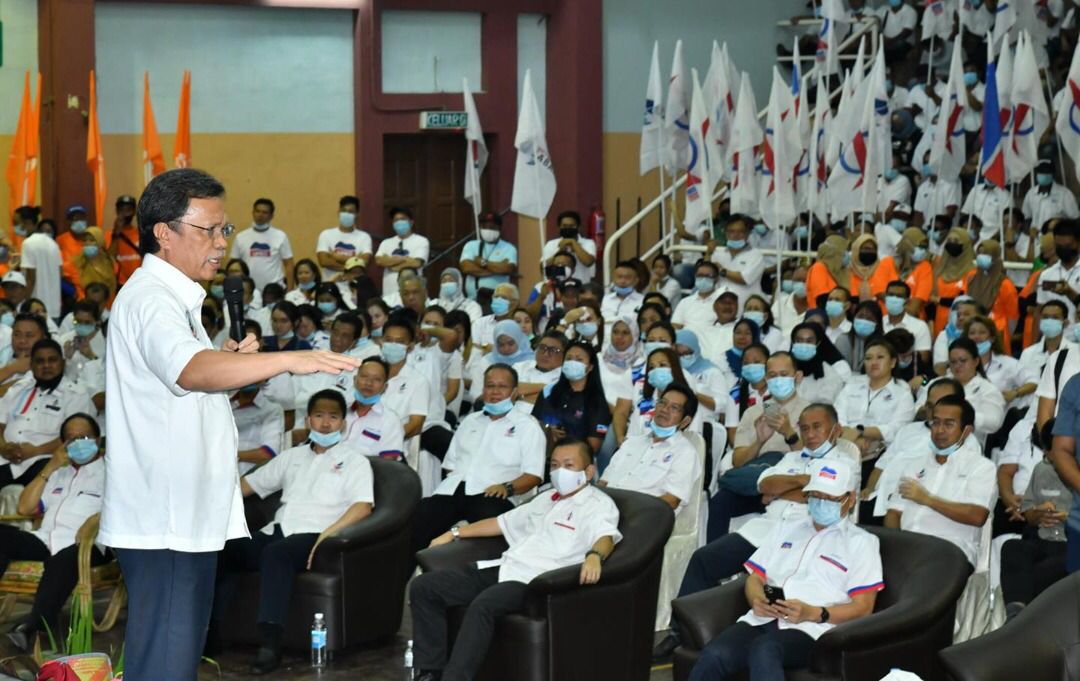
EK: The politics of Sabah is very fragmented but you say there are efforts to consolidate it.
SA: Yes…
EK: What are these efforts?
SA: I cannot spell it out in great detail because there will certainly be efforts to dismantle it.
EK: Do you feel adopting the Sarawak model of consolidating local parties is a way to stabilise Sabah politics?
SA: It is not going to be that way. I have got to strengthen my footing in Sabah. Currently, it is not good enough. I need to harness support from the interior parts of the state. That is presently the missing link. I don’t have prominent leaders who can attract support from that group of people.
Yes, it’s about leadership, but it is also about how we can move forward together. When I was chief minister I made sure I was CM for all Sabahans. The challenge really is about building trust, which will take a bit of time.
EK: Warisan did clinch the largest number of seats in the last state election before an alternative coalition was cobbled together to take over the state government. Yet, during your time as CM there was some disaffection that reforms were not moving as fast as they should. What were your real challenges as chief minister in terms of the pace change in Sabah?
SA: It all boils down to the fact that we exist within a federation. And when you are entangled with federal authorities it is difficult to reform the system.
The first thing I did as CM was to reform the civil service. I evaluated the civil service for some time and discovered that the delivery system was so poor.
Why was that? Because the civil service was hardly exposed to good governance, or a good management of the system. The previous leadership used only a cluster of people to get their things done. I needed a wider cluster of people who could deliver the sort of reform required, but I could not do it in such a short period of time.
One of the difficulties also was entanglement with federal authorities. I was seeking autonomy.
When I was at the (federal) Rural Development Ministry I visited so many villages in the country and discovered such lack in basic facilities, even though we passed millions and billions in Parliament on education and health.
You can have a very beautiful hospital, equivalent to a five-star hotel, but who is manning it? Not enough nurses, not enough doctors. And in the hospital they complain there is not enough medicine.
Where are the leakages?
That was one of the obstacles I sought to reform. When as CM I set up a Health Ministry in Sabah I was told “we already have a Health Ministry at the national level with a department here in Sabah.” So I said, “Yes, but I want to facilitate further.”
On security: ESSCom (Eastern Sabah Security Command), a federal agency, was responsible for the security of the east coast of Sabah. But when I had a chat with the commissioner of police he confessed they did not have enough money.
In my hometown of Semporna there were speedboats – more than 20 of them – but they hardly moved. I asked why they are not being mobilised for surveillance. The answer was “not enough money for petrol”.
So I put aside RM1 million a year for the police department and ESSCom – federal agencies financed by the state government. I did not consider the matter of federal agency, because I needed to ensure the safety of the state. When I tried to attract investors to that part of Sabah, security was always a deterrent. As a result, the growth of the economy slowed as a result of this.
It was not so easy, and I had only 26 months.
EK: You were among those described as a dark horse for the position of prime minister following the resignation of Muhyiddin. Yet you seemed ambivalent in your pursuit of that office. Is this a misconception?
SA: Yes.
We as an opposition bloc had an understanding. But it is a divided opposition bloc, and a losing battle for the opposition.
The main question is what am I supposed to prove to the people? Do I want to demonstrate a desire, obsession to become prime minister, even as there is another person claiming he has “formidable numbers”?
What are we talking about here?
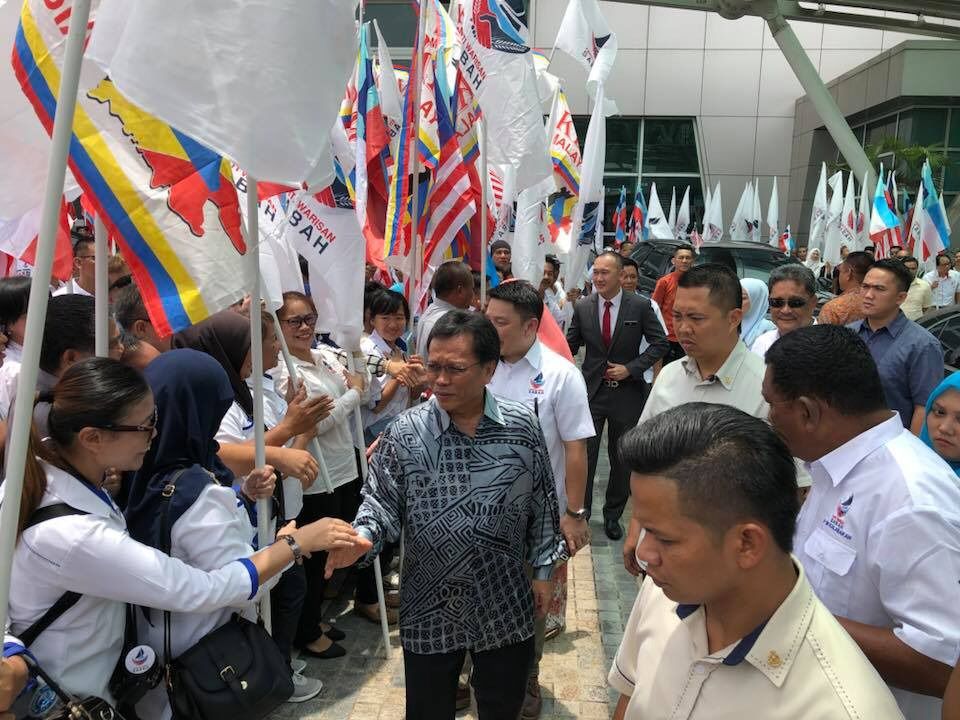
So it is not that I was not serious – I was… I came here (to Kuala Lumpur), communicated with some of my colleagues, trying to draw support, even among Sarawakians. But I got the message that because of my alignment with Anwar and DAP, there was reluctance. There is a bitter history between them, and that was the baggage I had to carry with me. And in the end they (Sarawak parties) said “sorry”.
But if you notice, they didn’t decide immediately; they kept their decision for a while. But they were also aware that if I offered myself for the position I could not rely on 100% support from PKR – DAP and Amanah, perhaps.
EK: So Sarawak parties were amenable?
SA: Well, they know me. I have been with them all this while, been close to them. Even my daughter-in-law is from Sarawak.
EK: What are the prospects of Warisan going national?
SA: We are a national party.
EK: What have been efforts then to harness Warisan at a national level?
SA: It is almost there.
Initially, there was the need to amend the constitution of the party, but now it is open to all, and Warisan is allowed to contest in all 222 parliamentary, and also state, seats in the country.
EK: You have spoken out consistently on problems affecting Sabah – from the pandemic to undocumented migrants. How much investment is there from the federal authorities in resolving Sabah matters? When do Sabah issues become national issues?
SA: Small efforts have been undertaken.
But when you are referring to Malaysians coming from the East Malaysian part of the world you get the sense that somehow the “love for nation” appears to be eroding.
Why is that?
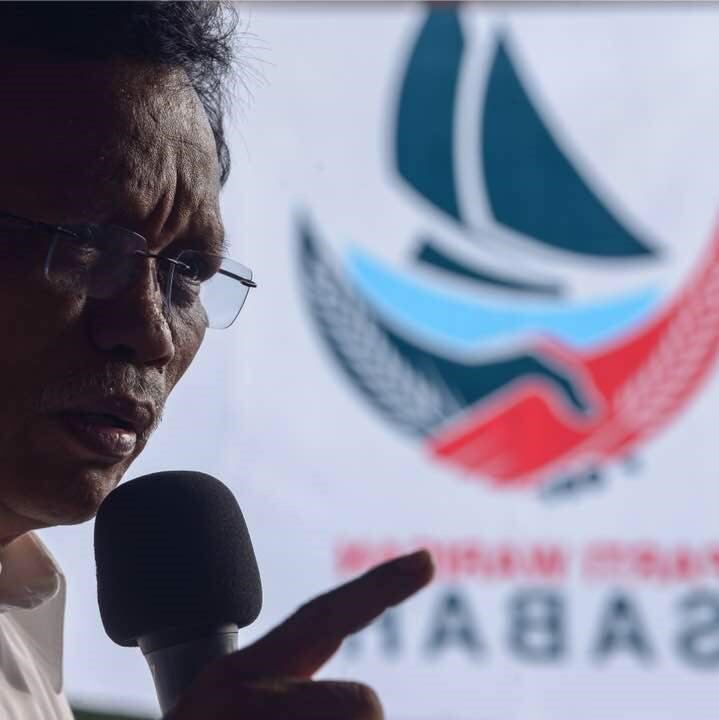
It is a question of trust: how just has the governing of the country been? Has it been fair to large parts of the country, especially Sabah and Sarawak? These are very rich states, contributing billions to the federal government, yet only a very small portion is returned to benefit these states in areas such as education and health.
When I was rural development minister, the two states got an allocation of RM5 billion each for the first time in their history, but somewhere along the way it didn’t tally to that amount, and was reduced to about RM3 billion. What happened to the rest? One of the main reasons for this is the slowness of the delivery system.
Nevertheless, when we talk about how we can overcome this problem of love for the country, it must not only be based on respect for culture, and differences; we need to use economic tools, provide jobs and opportunities so there is a level playing field.
And let’s not talk about the PM or deputy PM positions alone – what about the finance and other principal ministries in government? What about chief secretaries to ministries, other civil servant positions? And we’re not just talking about positions in the federal government. Even here in Sabah, many positions are occupied by people from the peninsula.
So people here start to question. This may appear like a minor issue, but it touches the hearts of the people. That is something we have to look into since it is all about truly building a nation.
And why should the matter of ‘Shafie is not a national leader’ arise? After serving the nation for 32 years, in seven ministries. ‘He is not a national leader’. Why? ‘Because he is from Sabah’.
EK: This sense of marginalisation is getting pervasive, and I am not even referring to secessionist sentiment, which does exist. How do we begin to bridge the alienation between East and West?
SA: You have to unwind. That’s why I think the wind from the East could be how we mould those policies to ensure how a multiracial society can be realised in Malaysia, an example to the world of how not to be divisive.
Under the current regime things are very divisive. If you listen to the speeches made by the late Tunku (Abdul Rahman), they were very inspiring. He was able to bring the people together, and create a bond between them and that’s how we managed to realise the formation of Malaysia, despite being divided by the South China Sea, and despite differences in culture and religious beliefs. That generation went beyond the barriers. Tunku was a man of personal piety, but in the evening he also knew how to ronggeng…
Why, then, should we now have extreme practices?
EK: In recent times we have witnessed greater participation of non-civilian forces in our politics – the royalty, for example. How do you think this institution would look upon the prospect of an East Malaysian prime ministerial candidate? How viable is a PM from East Malaysia at this time, really?
SA: It is not impossible.
I had attempted that when I contested for vice-president of Umno and won with a big majority, even though it was very tough.
A kampung boy coming from the small town of Semporna, hardly known, and contesting against the sons of former prime ministers – Hishammuddin (Hussein), Mukhriz (Mahathir) – and heavyweights like Isa (Abdul Samad).
Yet we were able to do that.
It is not impossible.
There is a window but we have to work hard to ensure the people not only accept, but trust us.
I have to clearly spell out what I stand for. There is a need for my voice to be heard, but more importantly, for the people to know what the content of my vision and my policies are. That is very important; there are many challenges but we must have the will. In politics, never give up.
In politics, never give up.
There is the need for us to ensure that in building a nation, East and West unwind any ill feeling between us, and at the same time ensure just development for all.
This is the most important thing for us to realise. – The Vibes, September 19, 2021



